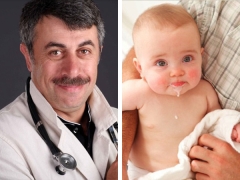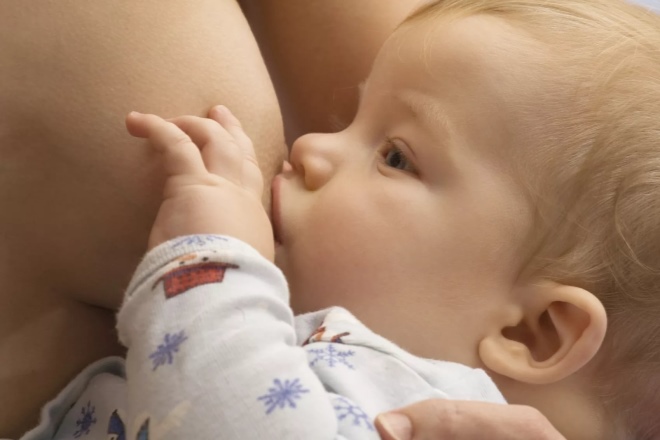Dr. Komarovsky about regurgitation
Issues that concern regurgitation in babies are among the most common among young parents and experienced moms. And all because there is practically no newbornswho would not do it. According to medical statistics, 8 of 10 karapuz do this. The only difference is in the frequency, volume and intensity of the process. The famous doctor Yevgeny Komarovsky tells what to do if the baby regularly “throws out” back some of the food eaten, whether it needs treatment.
About the problem
In medicine, regurgitation has the scientific name - gas-esophageal reflux. For the first time, as a medical phenomenon, it was described in the 19th century. Reflux develops, mainly after eating. It is manifested by the fact that part of the contents of the stomach in a passive way is thrown back into the esophagus, into the pharynx and mouth. As a result, the crumb “pleases” mom by giving back what was eaten recently, sometimes quite abundantly.
In an adult, food back cannot most often come out, since the whole barrier mechanism of different esophageal sphincters works. In newborns, especially premature babies, these “locking devices” are poorly developed. As they improve, regurgitation episodes occur less frequently, and then completely disappear. Underdevelopment of the digestive system is considered to be the main cause of gas-esophageal reflux.
In the first months of life, this phenomenon is considered physiologically sound, normal. In one third of children, digestion is normalized at the age of 4 months, most of the noodles stop burping at 5-6 months. Only in a small part of babies this is observed after 7 months, but by the year such a “late” child ceases to regurgitate completely.
If the general condition of the child is normal: the baby is gaining weight well, the pediatrician does not see any abnormalities, and the neurologist has not made a serious neurological diagnosis, then regurgitation does not cause any harm to babies.
Treatment
There is no magic pill for this phenomenon, says Yevgeny Komarovsky. Therefore, reflux treatment is always a complex of psychological and pedagogical measures aimed primarily at parents. They, alarmed and panicked, need to be explained in an accessible and understandable way that there is nothing pathological in this process, the child is not sick, does not starve, does not suffer and does not need to be hospitalized.
If this is possible, then another important point is explained to Mum and Dad. Burping is not vomiting. It is necessary to consult a doctor urgently if vomiting has opened, because this symptom is very dangerous for infants. When vomiting, in addition to food thrown out of the stomach (its large volume), the baby will have other symptoms. When reflux, nothing but a small amount of milk or the mixture that has gone outside no longer occurs with the child.
There are children with increased activity of the vomiting center, which can react with vomiting even to a small overeating. Such crumbs must be underfed, says Yevgeny Komarovsky, that is, limit the time they spend at the breast. And if a baby eats an adapted milk formula, then dilute it in a smaller amount than the age norm requires.
The main treatment for any regurgitation should be directed to ensure that the child does not overeat, because he will “throw out” the excess anyway. In severe cases, prescribe drugs to reduce gas formation - "Diflatil" or «Espumizan». Often and abundantly burping baby, especially if his reflux does not appear immediately, but after half an hour or even an hour after eating, Komarovsky advises to swaddle and put to sleep on his side so that the crumb does not choke in a dream.
If the baby is outraged by the need to sleep on its side (and this is not at all a rarity!), Then you can put an adult pillow under the mattress of the crib. On this elevation should be the back, but not the head of the baby. On the back it can be laid at an angle of about 30 degrees, in this position the danger of choking is minimized.
When you need a doctor
If the child is not gaining weight well, is noticeably lagging behind in development, then the regurgitation needs a correction, which the specialist will think up after the examination. It is necessary to turn to the doctor even if after a reflux episode the crumb behaves restlessly - it starts crying shrill, pressing its legs, writhing. This may occur if the esophagus is irritated by gastric juice. As a rule, this becomes possible with some pathologies of the digestive organs, with neurological problems.
Mom needs to see a doctor as soon as possible if the baby doesn’t belch not just milk or a mixture, but a brownish or greenish liquid, since this may be a sign of a serious pathology - bowel obstruction. Yellow masses from the stomach should also be the basis for a visit to the doctor, because they can talk about violations in the work of the stomach or pancreas.
Be sure to visit the pediatrician should be moms, whose kids did not regurgitate to six months, and after 6 months they have this problem has just begun. Regurgitation by the fountain is also a reason to seek help from a qualified specialist.
Tips of Dr. Komarovsky
If the child often regurgitates, parents should heed a few simple tips:
- during feeding, babies can swallow air - this is also one of the reasons for regurgitation. After eating, the crumbs must be held vertically, leaning against their shoulders and lightly tapping the back of the palm with your hand until the excess air departs;
- if the child is on bottle feeding, after prior consultation with the doctor, you should buy him not just an adapted mixture, but a product with an “anti-reflux” mark. It contains special safe thickeners, such as rice starch;
- after regurgitation do not try to feed the babyhis digestive ways need to be given some rest;
- if baby spits up through the mouth and through the nose, it is necessary to clear the nasal passages from the remnants of the contents of the stomach in order to prevent the development of bacterial inflammation;
- do not entertain your baby immediately after eating, but you need to leave it alone - so the probability of regurgitation decreases.
Burping is a problem that affects all nursing mothers and their babies. What to do and how to behave mom in this situation? Tips from Dr. Komarovsky from the video below will help with this.


















